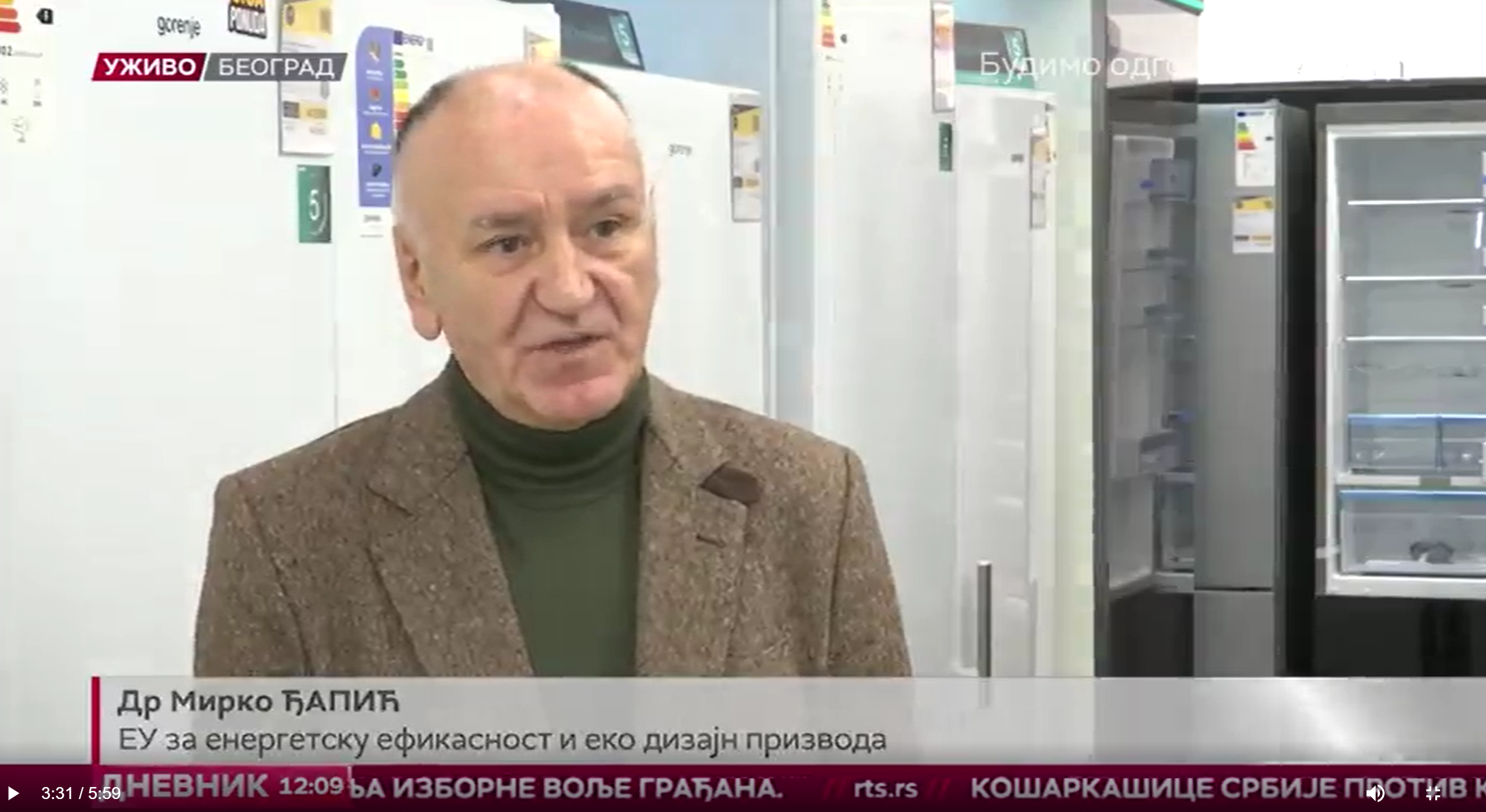
With the introduction of the new regulations of the European Union, the characteristics of the energy classes of products have been changed, and thus the energy labels. From now on, energy classes will be marked from the highest "A" class to the "G", the lowest. All producers must adhere to the new regulations, and what customers get with the new regulation, check Zoran Slepčevič.
Journalist: In the first place, customers will now be able to get all the information about how much the appliances consume electricity, water, etc. That and some other information will now be available to them. Mr Mirko Djapic, PhD will tell us more about it. Good after noon, thank you for speaking for Dnevnik.
How will customers benefit from the new regulations?
Mirko Đapić, PhD, project „EU for Energy Labelling and Eco-design of Products“: With the new regulations, customers will, above all, get accurate and reliable information about the energy characteristics of their products. It is up to them to decide for themselves: do they want to buy a product that consumes a little more electricity, or to buy a device that consumes a little less electricity, less water, creates less noise, etc. These labels are intended for consumers, and all the information contained therein is to the benefit of consumers, for their easier choice.
Journalist: There will no longer be "A +", "A ++", etc. when it comes to energy classes. And now when we have one refrigerator that costs 35,000 dinars and one that costs 65,000 dinars - why should a person opt for this more expensive one, if there are cheaper ones?
Mirko Đapić, PhD: That is a great question - for the simple reason that the one that costs 65 000 dinars has newer technology built in and it automatically consumes less resources, creates less noise, consumes less electricity... and take that product for ten years - in that time range the consumer will spend much less with that appliance than the one that is cheaper. But we, as ordinary consumers, are always more inclined to buy what is cheaper, but in the end it does not necessarily mean that it is better and more cost-effective.
Journalist: There are appliances on the market that have labels according to the old categorisation, and now although the new products and new categorization are coming, they will continue to be sold but will no longer value of "A" or "B" category labels, but will belong to "C", "D" or "F" - considering that there will now be seven classes.
Mirko Đapić, PhD: Absolutely. On personal example: I tried to find a TV on the internet in the German market - you can't find "A", "B" and "C" class TVs there, because this revision has raised a scale very much and manufacturers can not meet the requirements of these classes. If you buy a "B" class washing machine today, it means that it was probably "A +++". Another important fact that consumers need to know is that they cannot compare classes, old and new, because the ways of calculating them have changed. A deeper analysis could determine which class one would belong to, but the seller cannot tell you "this is 'A +++', which is now 'C'".
 Journalist: This means that producers will
also have to follow stricter rules.
Journalist: This means that producers will
also have to follow stricter rules.
Mirko Đapić, PhD: That's right. It is the obligation of the manufacturer to put new labels on the product after it is produced and to register it in the European database of energy labels for products.
Journalist: If we think long-term, in your opinion, we should watch for the energy class, but also the price.
Mirko Đapić, PhD: Absolutely.
According to research conducted in the European Union, 80% of European Union consumers when choosing a product are guided by the energy class of the product. In our country, unfortunately, only 13% of people choose a product based on its electricity consumption, which is devastating. And that is why we need to work on raising awareness about energy efficiency.
Journalist: The regulation was adopted, when can we expect it to enter into force, and what can importers and sellers expect?
Mirko Đapić, PhD: This is a framework regulation, which means that it defines general provisions for all products related to energy labelling, and for special product categories, such as washing machines, water heaters, refrigerators and others there are special bylaws. The framework regulation is currently being prepared, but what is important is that these bylaws are in force. Therefore, the new labels are mandatory for refrigerators, washing machines, dishwashers, tumble dryers, televisions and screens, and legal documents defining energy labelling of light bulbs should be in force soon.
Journalist: Thank you very much. So, in addition to considering energy efficiency, we need to consider how much we will save long-term to our wallet.